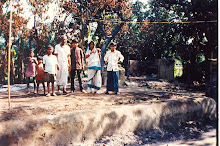Partition
Center Tribute
To
Bangabandhu
(Friend of Bengal) Sheikh Mujibur Rahman
On
MujibBarsha
(Year of Mujib) on his Birth Centenary
March
17, 2020
Partition
Center Report by
Sabyasachi
Ghosh Dastidar
Recently a group of
volunteers visited Bangladesh to pay homage to Bangabandhu (Friend of Bengal)
Sheikh Mujibur Rahman, or Mujib as he was/is lovingly called. To pay tribute
they visited his home in Dhaka, capital of Bangladesh, which is preserved as a
museum where he was assassinated, along with 26 members of his family including
a toddler grandson, by several thugs-claiming-to-be-military-personnel. (Sadly,
many of the killers were protected by the Bangladeshi government headed by
military general Zia, Pakistan, many Islamic nations, as well as many
governments in the West, including America, Canada and England.)
Hundreds of books are
available on Mujib, the Father of the Nation. Many are available on-line as
well as in hard copy.
Sheikh Mujib won the first
and only free election in Pakistan’s history in 1970. Yet, he was not allowed
to form a government by Pakistani Military and Pakistani Punjab and Sind elites
ushering in a nine-month genocide taking 3 million lives and abuse of ¼ million
women and girls. Yet Pakistan, U.N. or the democratic West neither asked for
trial of the killers nor arrested any of those killers sheltered in their
country. This is another example of support of brutality of the “civilized”
West!
Many in the Subcontinent
claim that after the rise of Wahabi separatist Islamist identity in Bengal in
1800s (see Ahmed, Rafiuddin, The Bengali
Muslims 1871-1906, A Quest for Identity, Oxford University, New York, 1981),
if it was the Indian nationalist poet-composer Kazi Nazrul Islam who started to
bring Bengali Muslims back to their multicultural nationalist root, it was
completed by Bangabandhu Mujib in conjunction with the Language Movement. Mujib
also complemented the march of many Bengali nationalists like Raja Ram Mohon,
Vidyasagar, Sri Ramkrishna, Rabindranath, Bankim, Nazrul, Sarat, Pritilata, Michael,
Surya Sen, Begum Rokeya, Sri Aurobindo, Subhas, Guru Harichand, Lalon, Pranavananda,
DwijendraLal, Atulprasad, RajaniKanta and many more. Mujib himself went through
a farfetched transformation from a supporter of pro-partition Muslim League in
Colonial India to a secularist politician eventually bringing Bangladesh’s
independence.
Way to Home Museum
Visit to his home
reminded me of events in faraway in Tallahassee, Florida where in 1971 a
Bangladesh Freedom Committee was formed to inform American public of Bangladesh
independence struggle and of Pakistani genocide. The Committee was headed by
Jacob George, a doctoral student from Kerala, India, Tulu-speaking Mr. Rao, a graduate student from Karnataka, India as Secretary, along with Prof. Datta – a
Hindu-E Pakistani-refugee-Indian, Prof. Nath – who later became a Dean in Dhaka
University, an Iranian, and two Americans. George was disliked by Nixon
supporters, and at times harassed by a Pakistani student. During one of the
meetings in fall of 1971 at the Florida State University campus, one uninvited
Pakistani professor told the group that “we will keep East Pakistan as Portugal
is keeping Angola.” Many in the community put bumper stickers printed by the
Committee saying “Stop Pakistani Genocide in Bangladesh.” Prof. Nath hearing
Pakistan Army’s surrender said, “I am going home,” which he did.
A Crowd at the Entrance
On October 19, 2019 at
the Partition Center’s annual conference, tributes were paid to Sheikh Mujib on
his Birth Centenary as well as to Mahatma Gandhi on his 150th Birth
Anniversary.
The group visited his
home-shrine-museum in Bangla winter of January. As picture taking is prohibited
inside the museum, here are some pictures of the area surrounding the museum,
as well as a few important places in his beloved Dhaka.
Dhaka Cityscape
Dhakeswari (Goddess of Dhaka) Mandir (Temple)
The National Flower













